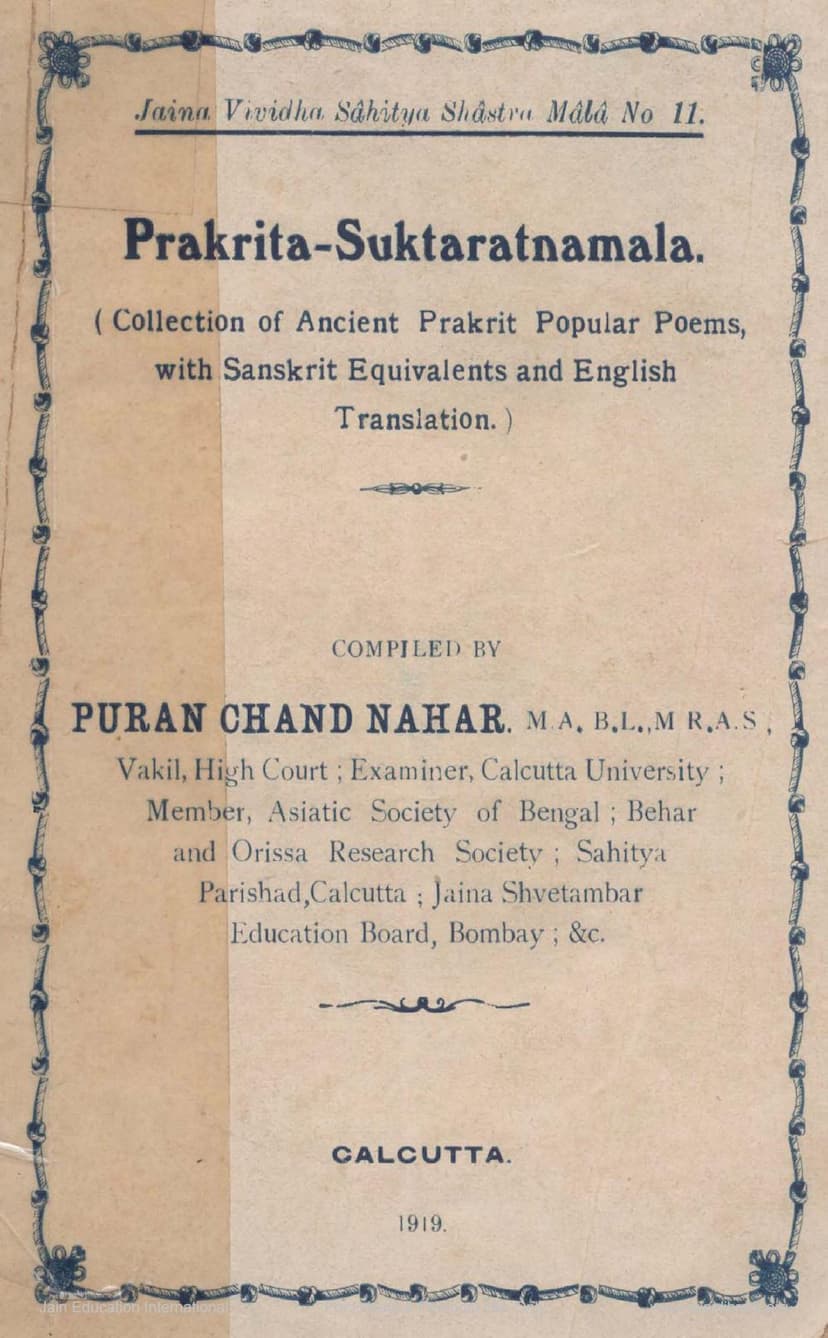Prakrit Suktaratnamala
Added to library: September 2, 2025

Summary
Here's a comprehensive summary of the Jain text "Prakrit Suktaratnamala" by Puranchand Nahar:
Prakrit Suktaratnamala: A Collection of Ancient Prakrit Popular Poems
"Prakrit Suktaratnamala," compiled by Puranchand Nahar and published in Calcutta in 1919, is Volume 11 of the "Jaina Vividha Sahitya Shastra Mala." This work is a significant compilation of ancient Prakrit popular poems, commonly known as suktis or aphorisms, presenting them with Sanskrit equivalents and English translations.
Author and Compiler: Puranchand Nahar, a distinguished scholar with multiple degrees (M.A., B.L.) and affiliations (M.R.A.S., Examiner at Calcutta University, Member of various learned societies), undertook this compilation. His dedication to Prakrit literature is evident in this meticulous work.
Preface and Linguistic Context: In his preface, Nahar highlights the importance of Prakrit language, suggesting its existence alongside, and possibly predating, Sanskrit. He notes that Prakrit was the vernacular language of everyday life and the primary medium for early Jain scriptures, chosen for accessibility to the masses. While Sanskrit later became prominent in Jain scholarly works, Prakrit remained the "fruitful mother" of modern vernacular languages like Hindi and Bengali. Nahar also engages with the debate on Prakrit's origin, positing that "Prakrita" (meaning "original" or "source") and "Sanskrit" (meaning "purified") suggest Prakrit was the popular source from which Sanskrit was derived through purification by learned Brahmins. He supports this by referencing Sanskrit dramas where Prakrit is spoken by common people and Sanskrit by the elite.
Content and Organization: The book is structured thematically, featuring verses categorized by subjects such as:
- Prakrit Poetry: Highlighting the beauty and value of Prakrit poetry.
- The Virtuous (Sajjanah): Praising qualities like truthfulness, benevolence, good conduct, sincerity, and steadfastness.
- The Wicked (Durjanah): Depicting the negative traits and consequences of wickedness.
- Company (Sangatih): Emphasizing the profound influence of association on one's character, illustrating how good company uplifts and bad company degrades.
- Travelling (Deshatanama): Discussing the benefits of travel for gaining knowledge of the world, people, and languages.
- Difficult to Attain (Durlabham): Listing rare virtues and opportunities in life, such as human birth, faith, self-control, and the teachings of Jinas.
- Time (Samayah): Reflecting on the transient nature of time and the importance of prompt action.
- Destiny (Daivam): Contemplating the role of fate and the futility of excessive worry.
- Nature (Prakrtih): Observing how true dispositions are revealed in various states of being.
- Ocean (Samudrah): Using the ocean as a metaphor for depth, limitlessness, and the shame of unfulfilled potential.
- Wealth (Vaibhavam): Discussing the fickle nature of wealth, its influence on perception, and the true measure of a person's worth.
- Child (Apatyam): Describing the joy and blessings children bring.
- Woman (Stri): Offering a nuanced, though somewhat traditional, perspective on women's character and influence.
- Transitoriness (Anityata): Reflecting on the impermanence of life, youth, wealth, and worldly possessions.
- Death (Mrtyuh): Contemplating the inevitability of death and the importance of living virtuously.
- Senses (Indriyam): Discussing the control of senses and the consequences of their indulgence or restraint.
- Action (Karma): Emphasizing the law of cause and effect and personal responsibility for one's deeds.
- Religion (Dharmam): Highlighting the importance of righteous conduct and the path to liberation.
- Non-injury (Ahinsa): Stressing the paramount importance of compassion and abstaining from violence.
- Truth (Satyama): Underscoring the value of truth and the destructive nature of falsehood.
- Chastity (Brahmacharyam): Praising the virtue of continence as the highest vow.
- Umpire (Madhyasthah): Discussing the qualities of impartiality and balanced judgment.
- Preceptor (Guruh): Emphasizing the transformative role of a spiritual guide.
- Sage (Munih): Describing the virtues of ascetics who control their minds and passions.
- Comparison (Tulana): Drawing parallels and contrasts between various aspects of life and virtue.
- Miscellaneous (Prakirnah): A collection of aphorisms covering a wide range of ethical, social, and spiritual observations.
Key Themes: The Prakrit Suktaratnamala is rich with wisdom that resonates with Jain philosophical principles and universal ethical values. Key themes include:
- Moral Conduct: The poems consistently advocate for virtuous living, ethical behavior, and the development of good character.
- The Law of Karma: The text frequently alludes to the principle that actions have consequences, both in this life and beyond.
- Transience of Life: A recurring motif is the impermanence of worldly possessions, youth, and life itself, urging readers to focus on spiritual pursuits.
- Control of Senses and Desires: The book emphasizes the need for self-discipline, restraint over passions, and the avoidance of vices like anger, pride, greed, and lust.
- The Importance of Good Company: The positive impact of virtuous association and the detrimental effects of negative company are clearly illustrated.
- Spiritual Liberation: The ultimate goal of detachment from worldly affairs and the pursuit of moksha (liberation) is subtly woven throughout the verses.
Significance: "Prakrit Suktaratnamala" serves as a valuable repository of Prakrit wisdom literature, making ancient ethical teachings accessible to a wider audience through its translations. It offers practical guidance for living a moral and meaningful life, grounded in Jain principles. The compiler's efforts provide a scholarly and accessible presentation of these timeless verses.